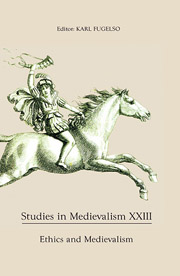Book contents
- Frontmatter
- Acknowledgments
- Contents
- List of Illustrations
- Epigraph
- Editorial Note
- I Ethics and Medievalism: Some Perspective(s)
- II Interpretations
- What if the Giants Returned to Albion for Vengeance? Crusade and the Mythic Other in the Knights of the Nine Expansion to The Elder Scrolls IV: Oblivion
- The Dark Ages of the Mind: Eugenics, Amnesia, and Historiography in Dan Brown's Inferno
- Plastic Pagans: Viking Human Sacrifice in Film and Television
- Meat Puzzles: Beowulf and Horror Film
- Words, Swords, and Truth: Competing Visions of Heroism in Beowulf on Screen
- Socialism and Translation: The Folks of William Morris's Beowulf
- “We Wol Sleen this False Traytor Deeth”: The Search for Immortality in Chaucer's Pardoner's Tale and J. K. Rowling's The Deathly Hallows
- Intention or Accident? Charles Alfred Stothard's Monumental Effigies of Great Britain
- Contributors
- Previously published volumes
The Dark Ages of the Mind: Eugenics, Amnesia, and Historiography in Dan Brown's Inferno
from II - Interpretations
Published online by Cambridge University Press: 05 May 2014
- Frontmatter
- Acknowledgments
- Contents
- List of Illustrations
- Epigraph
- Editorial Note
- I Ethics and Medievalism: Some Perspective(s)
- II Interpretations
- What if the Giants Returned to Albion for Vengeance? Crusade and the Mythic Other in the Knights of the Nine Expansion to The Elder Scrolls IV: Oblivion
- The Dark Ages of the Mind: Eugenics, Amnesia, and Historiography in Dan Brown's Inferno
- Plastic Pagans: Viking Human Sacrifice in Film and Television
- Meat Puzzles: Beowulf and Horror Film
- Words, Swords, and Truth: Competing Visions of Heroism in Beowulf on Screen
- Socialism and Translation: The Folks of William Morris's Beowulf
- “We Wol Sleen this False Traytor Deeth”: The Search for Immortality in Chaucer's Pardoner's Tale and J. K. Rowling's The Deathly Hallows
- Intention or Accident? Charles Alfred Stothard's Monumental Effigies of Great Britain
- Contributors
- Previously published volumes
Summary
Eugenics is one of those words that seems older than it is. The term itself, though, is actually younger than the movement that it has come to represent. Francis Galton, cousin to Charles Darwin and English public intellectual at large, first proposed his ambitious program of human improvement through selective breeding and sociological investigation in a two-part article, published in 1865 in MacMillan's Magazine and, in much more detail, in his 1869 Hereditary Genius. When the movement's first two names, “viriculture” and “stirpiculture,” proved to be public-relations nightmares, Galton subsequently coined the term “eugenics,” which, derived from the Greek for “good” and “birth,” was meant to imply the “conditions under which men of a high type are produced.” Eugenics, as such, began tinkering with its origins almost from the moment it was conceived. Concerned with establishing its own lineage, it returned relentlessly to history as a means of rationalizing many of the social, economic, and political measures that its proponents believed were necessary for the propagation of a more hygienic future.
The medieval was key to this strategy. As Charles Dellheim notes, Victorian historiography often found itself negotiating two sometimes-overlapping and sometimes-competing versions of the past: the classical and the medieval. Although eugenics had only just begun to come into its own at the sunset of the Victorian age, eugenicist historians were no exceptions to this rule.
- Type
- Chapter
- Information
- Studies in Medievalism XXIIIEthics and Medievalism, pp. 81 - 106Publisher: Boydell & BrewerPrint publication year: 2014



